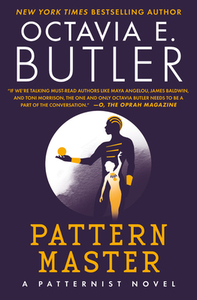Take a photo of a barcode or cover
This was a major disappointment. The worlds she build in the first three books got smashed together in this one without the care that she took to make for interesting characters or subtly complex relationships. I would still read books 1 & 3 but let your mind wander as how they resolve the stories.
I didn't realize it was 4th in a series. But what I did realize after I started reading was that I couldn't put it down. Butler is a master at creating worlds with their own unique conflicts, cultures, and politics.
I think this might be the weakest of the series. I'd made the mistake of reading the series in internal chronological order, and not publication date. To say this is the weakest, though, is misleading. It's an excellent book that I'd recommend to others. However, Wild Seed and Mind of My Mind far exceed what Butler does here. The themes that she develops in those books are but seedlings in this one, and so you might find yourself more satisfied to read in publication order, not the Seed to Harvest chronology.
dark
sad
tense
fast-paced
Plot or Character Driven:
Character
Strong character development:
Complicated
Loveable characters:
No
Diverse cast of characters:
Yes
Flaws of characters a main focus:
Yes
Reading the conclusion and understanding the publication order of the series makes a lot of things clearer. The strange transformation of Anyanwu into Emma, the vague reference to Doro here, the unspecified nature of the Clayarks. I think the effect is still somewhat diminished, nevertheless; the series feels like it moves in the wrong direction. Wild Seed is an epic generational tale, Patternmaster instead is merely a vignette into the conflict and society that we expect to have been built up. It is fun to see how the powers shape the society but nevertheless seems somehow disappointing after all of the build-up. There is a balance between theme and worldbuilding, and the latter felt a little lacking.
This book is short. Not so sweet. I had to pace myself so I wouldn't devour it in one sitting. It started off in the thick of things. A supreme being "the Pattern Master” is preoccupied with is slipping hold on to the fabrics that hold his world together-literally. He is in charge of the entire telepathic network of consciousness. ohhhhhhhhhhhhhhhhhh. Scary, but not really. Unlike her other works this particular one is not as foreboding and apocalyptic as the others. Although the general premise is that Doro the strongest telekinetic being on distant earth is about to be usurped by one or more of his eugenically designed children.
“People” who have the mental capacity to transmit, interrupt, and manipulate consciousness (absorb memories, feelings, read thoughts, cause pain, kill, maim, and heal) are the landed gentry-“House Masters”. People with lesser powers and no allegiances are the lords and vassals in this futurist word- The Independents and mostly Healers (self-explanatory). Those who cannot feel the force
Clayarks are determined to wipe out the Patternist (and steal all their resources). They dip their bullets in their salvia so they can kill and maim by spreading their disease. Eww! The Mutes are just happy to be under the protection of Patternist, because otherwise they’d be left to contend with the rebuilding civilization and fighting off the mutant creatures/catching their disease.
At any rate the story is about a really mean Housemaster Coransee and his little brother Teray. The older telepath is on that Machiavelli path to gaining total power. He wants to control the Pattern. He is destroying any one and anything that stands in his way/refuses to become his ally. Young Teray is young and idealistic. He just graduated from the telepath training academy-school (yeah like the one Professor Xavier runs in X-men). But his older brother whom he knows nothing about connives and schemes to force him into slavery. He loses his wife. He loses his freedom. He makes a friend in his household, a bisexual Healer named Amber and they make a run for the border. They bond. They complement each other well. Coransee uses one against the other.
Lots of people die. Lots of people get hurt-legally, emotionally, and physically. There is an epic battle.
That is the plot. The subtext is lacking in substance, but it surmises with the thought: absolute power corrupts absolutely. Being stronger than a person doesn’t make you better than them. Everything is not as it seems. Survival is the overwhelming constant. You will never be a slave as long as your mind is still free....
There is no logic behind it. I don’t think it’s supposed to make too much sense. It’s a short book; one that’s supposed to set the stage for the three novels to follow, so we forgive Ms. Butler….I really enjoy the sci-fi themes, but the story development leaves much to be desired. It was a fair attempt. I give it a C+
What can I say about this book that I haven't said about the rest of the series? Just a phenomenal story with insightful exploration of freedom, oppression, and power dynamics. I feel like I can sit and chew on all four of these for a good, long while.
dark
reflective
medium-paced
Plot or Character Driven:
A mix
Loveable characters:
No
Flaws of characters a main focus:
Yes
I enjoyed this book but I wasn’t blown away by it. It was short and felt fairly simple with one main objective that was met in the end. It’s a science fiction book where the humans have powers to connect with others telepathically for both good and evil. It’s a society with a hierarchy, house masters, mutes, and human-type “enemies.”







